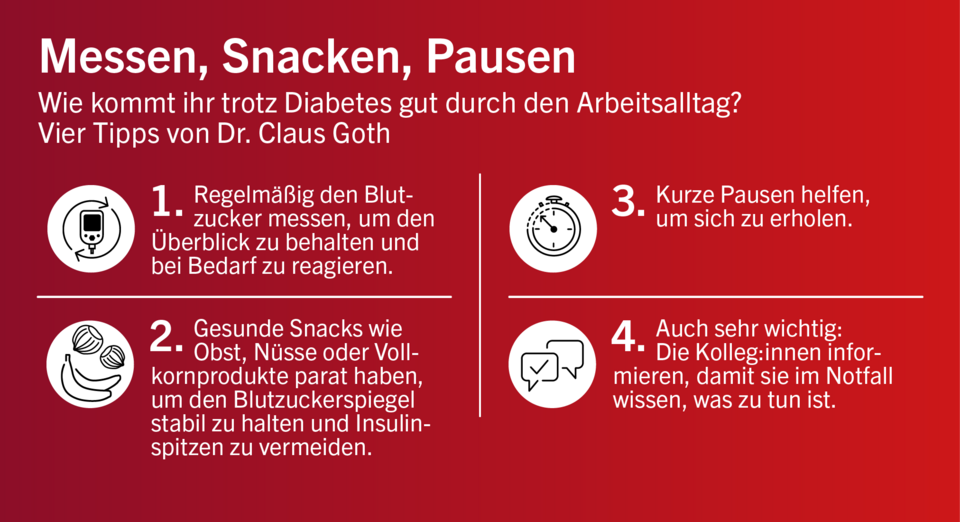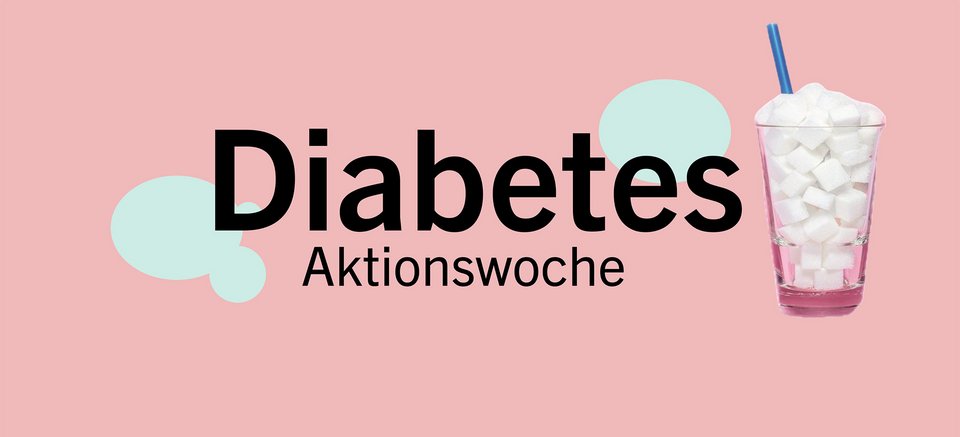
To mark World Diabetes Day on 14 November, we ask the following questions in advance: What is diabetes? Where does it come from? How can you fight it? And how do employees deal with the disease in their day-to-day work? Answers are provided by occupational physician Dr Claus Goth and Scott McDonald, representative for the disabled.
one: Dr Goth, what is the difference between type 1 and type 2 diabetes?and what are the first signs?
Claus Goth: Type 1 diabetes is an autoimmune disease in which the immune system destroys the insulin-producing cells in the pancreas, leading to a complete lack of insulin. Type 1 usually occurs suddenly and often affects children and adolescents. The first signs can be frequent urination, severe thirst, tiredness and blurred vision.
Type 2 diabetes, on the other hand, develops gradually and is often associated with obesity and an unhealthy lifestyle. Although the body produces insulin, the cells no longer react properly to it ("insulin resistance") and no longer absorb the sugar from the blood. This type usually only occurs in later adulthood and is also known as "adult-onset diabetes".
one: What can one do to prevent it?
Claus Goth: Type 2 diabetes can be prevented through a healthy lifestyle. It cannot always be prevented, especially if there is a family history - but at least the onset can be postponed or its severity reduced.
A healthy lifestyle means paying attention to your diet, i.e. eating lots of vegetables, fruit, wholemeal products and little sugar and fat. Then regular exercise: be active for at least 30 minutes a day, whether walking, cycling or swimming. Control your weight: Avoid or reduce excess weight, especially belly fat. And also reduce stress: Relaxation techniques such as yoga or meditation can help.
Dr Claus Goth, a doctor of general, occupational and sports medicine, heads the B-A-D health centres in Bonn and Cologne. The B-A-D company medical service offers REWE Group and its employees services in the areas of occupational medicine and health care, including psychosocial counselling.


To mark World Diabetes Day on 14 November, REWE Group is inviting its employees to a diabetes action week with presentations and life events (14-22 November), during which they can order diabetes test kits. More information will be available from 28 October on the intranet and via the health platform Gemeinsam.topfit. And next week, we will be introducing colleagues who talk about how they deal with diabetes.
"It is important that employers show understanding for chronic conditions such as type 2 diabetes, especially when it comes to break times and the special needs of the workplace. With type 2 diabetes, regular monitoring of blood glucose levels and regular food intake can be crucial for the health of those affected. Employers should therefore take the following four points into account
- Flexible break times: People with diabetes need regular breaks to check their blood glucose levels or eat something. It should be possible to take these breaks flexibly if necessary, especially when symptoms of hypoglycaemia occur.
- Access to appropriate foods: Some diabetics need access to healthy snacks to keep their blood glucose levels stable. Employers could support this by providing a healthy working environment, for example by providing break rooms with access to a kitchen facility.
- Adjusting working hours: In some cases, adjusting working hours may be necessary if, for example, shift work or extreme working hours negatively affect blood glucose levels.
- Stress management: Stress can increase blood sugar levels. Employers can help to make the working environment more diabetic-friendly by taking measures such as flexible working hours or offering stress management programmes.
- Education and awareness-raising: It is helpful to educate the team about diabetes, also so that colleagues can react in an emergency, such as hypoglycaemia.
Scott McDonald is Chairman of the General Representative Body for Employees with Disabilities at REWE and PENNY Markt GmbH.













Both German and English comments appear here.
Type 1 can _not_ be prevented with a healthy lifestyle. It's a pity that the differentiation between type 1 and 2 has already been lost in the second answer.
Hello Christian, thank you for your comment. We have revised the answer in the article slightly so that the reference to type 2 should be clearer. You may be interested in the second part of the series, where two colleagues with type 1 and one with type 2 talk about how they live with diabetes: one.rewe-group.com/magazin/magazin-artikel/item/Article/showMag/nehmt-die-krankheit-von-anfang-an-ernst. Best regards from the editorial team
Thanks for clarifying! I used to be asked a lot if I ate too much sugar and was ill because of it. As a teenager, this made me very depressed and I didn't talk openly about my illness for many years. Type 1 diabetes is an autoimmune disease and there is still no cure for it, which means that people with type 1 have to inject insulin their whole lives and adjust to their illness and the changing conditions every day.